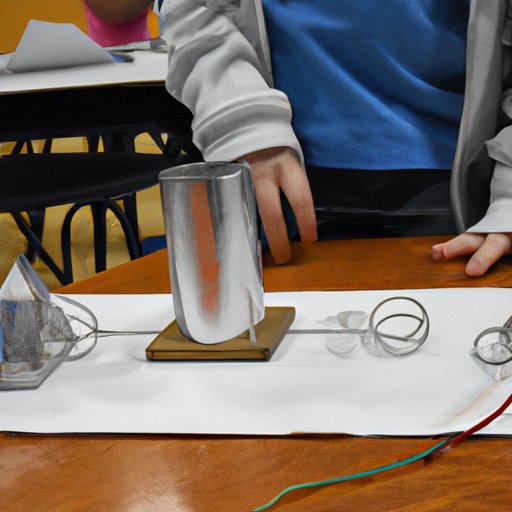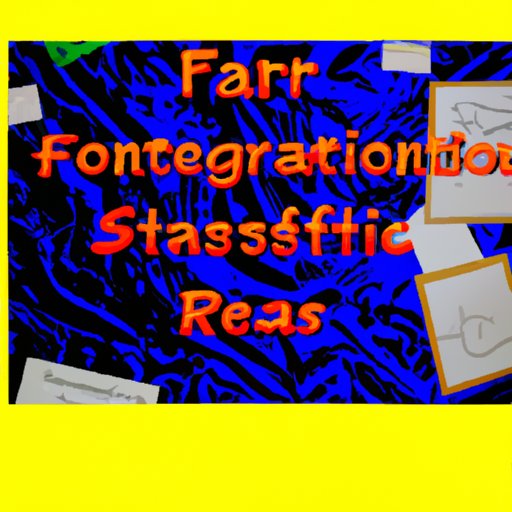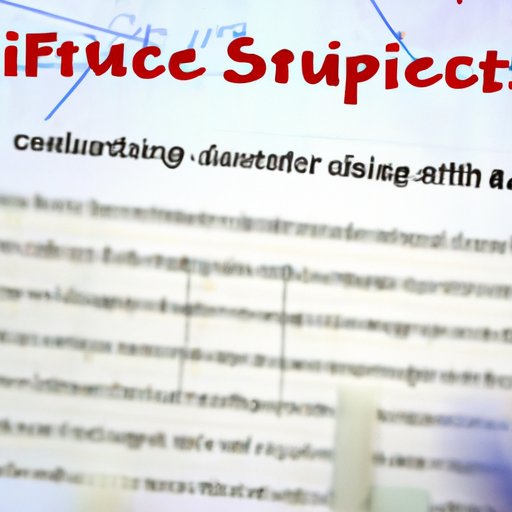Introduction
An abstract is a summary of a research project or paper that is typically included as part of a science fair project. It is usually one page in length and includes the main points of the project, such as the purpose, methodology, results, and conclusions. The abstract should provide readers with a clear understanding of the project and its main ideas.

Exploring the Role of Abstracts in Science Fair Projects
Abstracts are used to communicate the key components of a science fair project. They provide an overview of the project and allow readers to quickly understand the main points of the project. By including an abstract, readers can quickly decide if the project is relevant to their interests and worth exploring further. An effective abstract will also make it easier for a judge to assess the project.
Writing an effective abstract for your science fair project has many advantages. It allows you to clearly explain the purpose and scope of your project, as well as the methods you used and the results you obtained. It also helps you organize your thoughts and keep track of important information. Finally, it can also serve as a valuable reference to help you create a more detailed report or presentation of your project.

Crafting an Effective Abstract for Your Science Fair Project
When crafting an effective abstract for your science fair project, there are some general guidelines to follow. First, the abstract should be no longer than one page in length. Second, the abstract should include the project’s purpose, methods and materials used, results, and conclusions. Third, the abstract should be written in a concise and clear manner, avoiding unnecessary details. Finally, the abstract should be proofread for grammar and spelling errors.
To help illustrate these guidelines, here are two examples of good and bad abstracts. The following is an example of a good abstract:
“This project examined the effects of different types of fertilizer on the growth of tomato plants. Three types of fertilizer were tested: organic, chemical-based, and natural. The plants were grown in identical conditions and monitored over a period of three months. The results showed that the organic fertilizer had the most significant effect on plant growth, followed by the natural fertilizer, while the chemical-based fertilizer had the least effect. These findings suggest that organic fertilizers are the best choice for optimal plant growth.”
The following is an example of a bad abstract:
“I did a science project about tomatoes and fertilizer. I grew the tomatoes with different types of fertilizer and then measured the height of the plants after three months. The organic fertilizer worked the best and the chemical-based fertilizer didn’t work so well. I think this shows that organic fertilizer is better for growing plants.”

Writing an Abstract for a Science Fair Project: Tips and Tricks
Writing an effective abstract for a science fair project requires attention to detail and careful editing. Here are some tips for making your abstract stand out:
- Keep it short and to the point.
- Include all the necessary information without going into too much detail.
- Make sure your language is clear and concise.
- Proofread your abstract for grammar and spelling errors.
In addition to these tips, there are also a few helpful strategies for writing a clear and concise abstract. First, focus on summarizing the main points of your project. Second, use active voice rather than passive voice when writing your abstract. Third, use simple language and avoid jargon or abbreviations. Finally, make sure to include any relevant background information or references.
How to Write an Abstract For Your Science Fair Project
Now that you have a better understanding of the importance of writing an effective abstract for your science fair project, here is a step-by-step guide for how to write one:
- Start by reading through your project and taking notes on the main points.
- Write a rough draft of your abstract, focusing on summarizing the main points of your project.
- Read through your draft and edit for clarity and conciseness.
- Check your abstract for grammar and spelling errors.
- Revise your abstract until you are satisfied with the end result.
It is also important to know what common mistakes to avoid when writing an abstract for a science fair project. First, do not include too much detail or information that is not relevant to the project. Second, do not make overly broad statements or use vague language. Third, do not use first person pronouns or subjective language. Finally, do not forget to proofread your abstract for grammar and spelling errors.
The Basics of Writing an Abstract for a Science Fair Project
When writing an abstract for a science fair project, there are some important elements to keep in mind. First, make sure to include the purpose of your project, the methods and materials used, the results obtained, and the conclusions drawn. Second, make sure to keep the abstract to one page in length. Finally, make sure to follow formatting guidelines, such as using 12-point font, 1-inch margins, and double spacing.
What is an Abstract? A Guide to Writing for Science Fairs
An abstract is an important part of any science fair project. It serves as a summary of the project and can help readers quickly understand the main points. Writing an effective abstract requires careful planning and attention to detail. By following the guidelines outlined in this guide, you can craft an abstract that will help make your science fair project stand out.
Conclusion
An abstract is an important component of any science fair project. It serves as a summary of the project and provides readers with an overview of the main points. When writing an abstract for a science fair project, it is important to follow general guidelines and to pay attention to detail. By following these guidelines, you can craft an effective abstract that will help make your project stand out.
(Note: Is this article not meeting your expectations? Do you have knowledge or insights to share? Unlock new opportunities and expand your reach by joining our authors team. Click Registration to join us and share your expertise with our readers.)
